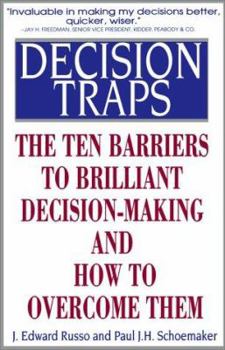Decision Traps: The Ten Barriers to Decision-Making and How to Overcome Them
Select Format
Select Condition 
Book Overview
Two experts in business management show how to avoid the ten common pitfalls that ensanre decision makers. The very latest research in the fields of business and psychology has been distilled into practical training methods that will save readers from ever making a bad decision again.
Format:Paperback
Language:English
ISBN:0671726099
ISBN13:9780671726096
Release Date:October 1990
Publisher:Fireside Books
Length:304 Pages
Weight:0.67 lbs.
Dimensions:0.8" x 5.5" x 8.4"
Customer Reviews
5 ratings
Excellent book on decision making
Published by Thriftbooks.com User , 19 years ago
This book discusses ten common errors that people make in decision making, and how to avoid them. When I first saw this title, I was not that interested, because I wanted a book on how to make decisions, not on the errors that people make. After reading it, I find the information to be very useful and practical. This is one of my all time favorite books, I go back to it every so often, and even after reading it a few times I find myself making some of the errors that are discussed in the text. Hopefully I don't make as many as I used to! I know the ideas in this book have been a very substantial help in improving my decision making process, and I am getting better as time goes by. Very highly recommended!!
I loved this simple book about the process behind good decisions
Published by Thriftbooks.com User , 19 years ago
I write about scientific careers, and one of my favorite books is Decision Traps. I recommend this book to anyone who is facing a major career decision, and who would like to separate the emotion from the facts in the decision process. Too often we cloud our decisions with personal feelings and ill-conceived "rules of thumb." This book will help you eliminate decision shortcuts which traditionally DON'T lead to the best answer. It worked for me in my personal life as well. Really helps you understand how your mind works.
Too much belief in personal judgment
Published by Thriftbooks.com User , 20 years ago
Most decisionmakers make the same kinds of error. There needs to be a frame for each problem. There should be avoidance of plunging in and relying too heavily on supposed good judgment. Drawing boundaries are part of framing the questions. Managers are apt to draw narrow boundaries. Sometimes there is a failure to draw a boundary line. There is the sunken cost fallacy, basing current and future changes in operation on past expenditures for equipment. One is influenced by reference points in the the problem frame. Some decisions make sense through several different frames. In such a case there can be certainty that the decision is a good one. Good communicators align their communications with the listeners' frames. Virtually all people put too much trust in their own opinions. Most people favor data supporting current belief. Wrongly we associate confidence with competence. One should be a realist when making a decision and an optimist when implementing it. Rules of thumb and other decisionmaking shortcuts are called heuristics. The disadvantages of intuitive decisionmaking are more profound than people realize. Members of groups may agree prematurely on wrong decisions. Groups may suffer from too much cohesiveness, harmony, pressure, insulation, and strong leadership. In group think people practice self-censorship, pressure others, give in to an illusion of invulnerability and erroneous stereotyping. Groups composed of people of mixed types of personality are useful--receptive versus focused and thinking versus feeling types. The book is written in veritable outline form, presumably to get the attention of busy managers. It has a extensive notes supplementing the text giving a student of business and other fields an opportunity to pursue related lines of inquiry.
Highly Useful
Published by Thriftbooks.com User , 24 years ago
I came across a reference to this book in my Economics Textbook in my MBA. The name attracted and hence I bought this book.This is an excellent book that explains how managers, however experienced, can become complacent and forget major steps in decision making. It really helped me to understand decision making as a process in a better manner than what I had already learnt. I think that everyone who makes any major decisions, in whatever capacity, should read this book. It helped me to think better.
One of the best management psych books
Published by Thriftbooks.com User , 25 years ago
I had the pleasure of taking Jay Russo's course at Cornell that he used to prototype this book. The course was great, and the book shows it. It's a readable, understandable guide to the primary psychological traps that make people make bad decisions. You'll be left with the feeling, "why didn't *I* notice that?"





